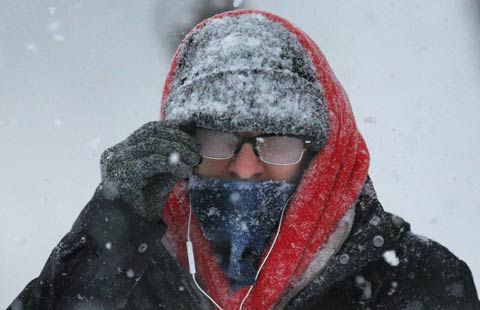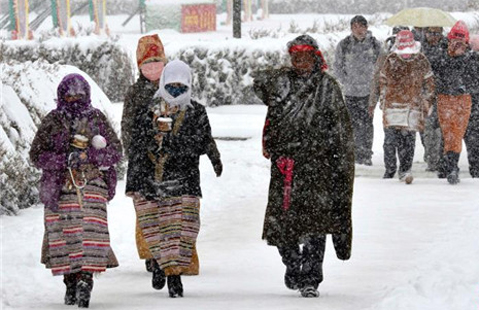Let the elders tweet first: tips for CNY in Internet era
Updated: 2015-02-17 18:50
By Liu Jing(chinadaily.com.cn)
|
||||||||
 |
|
A goat-shaped lantern is seen at the entrance of the Ancient Cultural Street in Tianjin, north China, Feb. 15, 2015. Sumptuous goat-themed ornaments can be seen all around in Tianjin to greet the upcoming Year of Goat, which falls on Feb. 19 this year.[Photo/Xinhua] |
Don't post New Year feast pictures online before the seniors do and give "like" to their posts as soon as they are out.
This is one of the many dos and don'ts for the upcoming Spring Festival spread amongst Chinese netizens in the age of the Internet.
The 10 tips first composed and published by a netizen going by the handle of @xiaoluohetaziji has received more than 9,000 reposts on Sina weibo, a Chinese Twitter-like microblogging platform.
The tips also covered advice on table manners such as not eating until elder family members have finished taking pictures of the food.
The author also encouraged other netizens to show their hospitality for visitors by offering WiFi passwords and refraining from sending New Year greeting messages on the hour to make it easier for others to grab cash-stuffed red envelopes, or hongbao online.
Digital Hongbao apps, originally a sub-application of Tencent's Wechat messaging application, has taken the tradition of yasuiqian (giving money to children for good fortune on Chinese New Year) online by enabling users to give friends a certain amount of money through the Wechat payment system.
Alipay, the Alibaba backed digital payment platform, and Wechat also offered their users hongbao -- 600 million yuan and 3.6 billion yuan respectively in cash and online shopping coupons. Other Internet companies have followed Alipay and Wechat's actions, but critics have complained the actions are commercializing the festival.
The spread of the Internet is changing the way people mark the ancient festival.
Taobao and other shopping websites are selling everything from New Year goods to New Year's Eve dinners.
Even firecrackers have gone virtual as this Spring Festival tradition is banned in 138 cities and strictly limited in another 536 cities due to the pollution it creates. For those who really miss setting fireworks, the flashing lights and bangs are available on the Internet.
However, some Chinese miss the Spring Festivals of old.
"Electronic products have widened the distance between people", wrote Sina Weibo user @ranshaoxiaoyuzhou.
Another user, @Huopotubaoang writes that it's the people who have changed, not the Spring Festival.
Most Viewed
Editor's Picks

|

|

|

|

|

|
Today's Top News
New visa policy draws more Chinese tourists
UN Security Council slams IS murders of 21 Egyptians
Austria on high alert following Denmark terror attacks
Web users deride, defend rouble-weather link
China to import more iron ore from Vale
Mexico makes moves to attract more Chinese tourists
Brazil, Peru and China to specify railway details
Growing up recluse in a dazzling world of Manhattan
US Weekly

|

|







